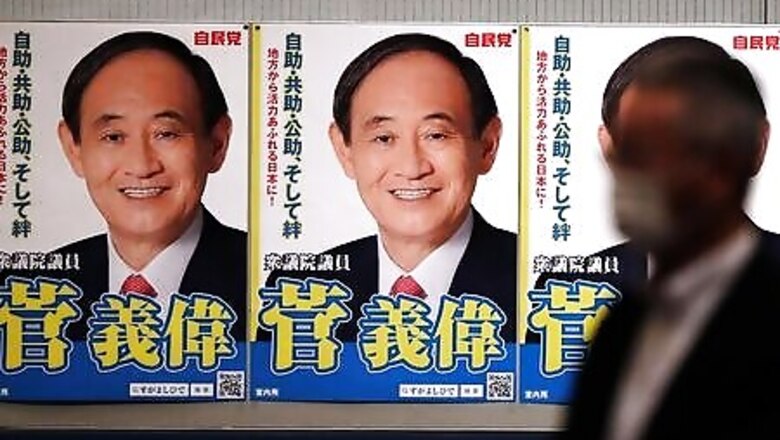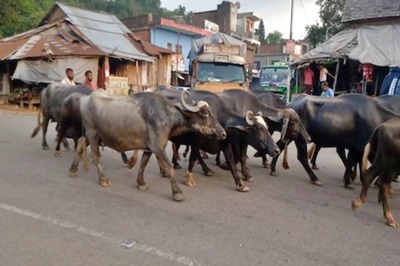
views
TOKYO: Japanese Chief Cabinet Secretary Yoshihide Suga and two other candidates officially started their campaigns on Tuesday to succeed Prime Minister Shinzo Abe as the leader of the ruling Liberal Democratic Party (LDP), and as premier.
Abe late last month announced he was resigning because of poor health, ending his tenure as Japan’s longest-serving prime minister.
A leadership election is set for Sept. 14 with LDP lawmakers and regional party representatives casting votes. The winner is virtually assured of becoming prime minister because of the LDP’s parliamentary majority.
Here is where Suga, a clear frontrunner, stands on some key policies. Former Defence Minister Shigeru Ishiba and former Foreign Minister Fumio Kishida are also running.
ECONOMY
A longtime lieutenant of Abe, Suga aims to continue the incumbent’s hyper-easy monetary policy, stepped-up government spending and structural reforms, dubbed “Abenomics”.
“I will keep Abenomics and take it forward,” Suga, 71, said on Tuesday.
Announcing his candidacy at a news conference last week, Suga voiced his readiness to have the central bank take additional easing steps to protect jobs, if he were to become prime minister.
Suga opposes lowering the 10% sales tax rate, which he sees as indispensable to social security reforms. Some lawmakers have proposed lowering the tax to reduce the burden of the coronavirus pandemic on households.
In an interview published in the Nikkei business daily on Saturday, Suga said he would consider compiling another economic stimulus package by the end of the year to “put the pandemic to an end and shift the economy to a new stage.”
A son of a farmer from northern Japan, Suga counts the revitalisation of the regional economy as one of his key priorities.
REFORMS
As a strong proponent of reforms in both the public and private sectors, Suga favours greater consolidation of regional banks and has also reiterated his intention to ask mobile phone carriers to lower fees, which he has advocated during Abe’s tenure.
He advocates setting up an agency to promote the government’s digital strategies under one roof and said in a recent newspaper interview that he will look into a possible overhaul of the health ministry, which came under fire for its handling of the coronavirus outbreak.
“On becoming the LDP president, I would break down the vertically segmented administrative system, get rid of vested interests … and do my best to push ahead with regulatory reforms,” Suga said on Tuesday.
DIPLOMACY, SECURITY
Suga regards Japan’s alliance with the United States as the mainstay of Tokyo’s diplomacy and security, and seeks stable ties with neighbouring countries including China.
Suga told reporters last week that he is willing to meet with North Korean leader Kim Jong Un with no preconditions to help resolve the issue of Japanese citizens abducted by North Korea decades ago.
He is for revising the U.S.-drafted pacifist constitution, a much cherished goal of Abe that ultimately eluded the outgoing prime minister.
Asked about his position on Japan possibly acquiring the capability to strike enemy targets, he said on Tuesday he would first observe ruling party debate, without specifying where he stands on the issue.
CORONAVIRUS AND BEYOND
Suga aims to boost coronavirus testing capacity and secure enough vaccines for Japan’s entire population by the middle of next year.
He is a strong promoter of tourism as a way to drive local economies and signalled in a recent interview with Reuters the importance of re-opening the economy and also ensuring that the pandemic is contained.
In the interview he also stressed that Japan would do “whatever it takes” to ensure it could host the Olympics next year. The event was originally planned for this summer but postponed for a year due to the pandemic.
On Tuesday, he told a press conference that preventing the spread of the coronavirus will take priority in any decision on holding a snap election.
Disclaimer: This post has been auto-published from an agency feed without any modifications to the text and has not been reviewed by an editor




















Comments
0 comment